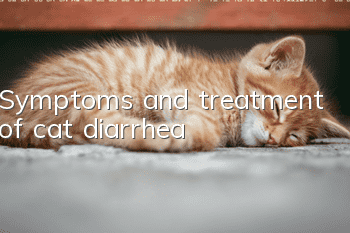Symptoms and treatment of cat diarrhea

Diarrhea is one of the common diseases in cats. There are many reasons for cat diarrhea, such as catching cold, parasitic diseases, indigestion, etc., which may cause cat diarrhea. If the owner finds that the cat has diarrhea, he should actively treat it to avoid worsening of the condition, and should not give medicine indiscriminately.
1. Cause:
1. Overfeeding or eating food that is difficult to digest, the gastrointestinal tract cannot be digested and absorbed, and the food is excreted almost as quickly as it is, causing diarrhea;
2. Due to enteritis or gastritis, the gastrointestinal tract digests and absorbs food and excretes the inflammatory products together, resulting in diarrhea;
3. The presence of roundworms, tapeworms, flagellates, coccidia, etc. in the intestines, as well as cold, fright and other factors can lead to accelerated intestinal peristalsis and diarrhea;
4. Some breeds of cats suffer from diarrhea due to the lack of enzymes that decompose lactose, sucrose, and maltose in the intestines, or congenital defects such as lack of small intestinal chorionic membranes. Sugar or other nutrients, water, etc. cannot be fully digested and absorbed;
5. Suffering from tumors, oncocytoma, hepatitis, pancreatitis, etc. can cause diarrhea;
6. Deficiency of fat-soluble vitamins, pica due to lack of trace elements, and pathogenic microorganisms can cause diarrhea.
2. Symptoms:
Sick cats have increased defecation frequency, and their feces are shapeless, thin, or watery. Some of them are sour and unpleasant, or contain food residue or are mixed with foam, or are light yellow or other colors. In the early stage, intestinal sounds are hyperactive, mental body temperature changes little, and drinking water increases. If left untreated, body condition will decline, excessive lying and laziness, hindquarter pollution, anal laxity, loss of appetite, and eventually dehydration, weight loss, heart failure, and death.
3. Diagnosis:
Based on medical history and clinical symptoms, a preliminary diagnosis can be made. To diagnose the disease and find out the cause, you can test for parasite eggs in the feces, measure the lactic acid content in the feces and the lactase in the intestines; analyze the breed to find out genetic defects, secondary disease and other causes of the disease.
4. Treatment:
1. For overeating diarrhea, first fast, then feed 0.5g pepsin, 2 times a day; 0.5g pepsin/time, 2-3 times a day; dry yeast, 1 tablet per cat each time , take 2-3 times a day; Multienzyme 1 tablet each time, 3 times a day orally.
2. For diarrhea caused by parasites, effective anthelmintic drugs should be used. After expelling the parasites, a certain appetizing, spleen-strengthening and anti-diarrheal drug can be used.
3. Diarrhea whose cause is temporarily unclear can be treated symptomatically, and the underlying cause can be treated after the cause is found.
4. For diarrhea caused by pathogenic microorganisms, chloramphenicol should be used, 30,000 units/kg, twice a day, roe deer antibiotics,Sulfa drugs. If dehydration is obvious, glucose and normal saline should be administered.
5. Traditional Chinese medicines such as Myrobalan, Black Plum, Coptis Rhizoma, Huoling, Shenqu, Atractylodes, etc. can be used.
- How to train a Maine Coon cat to use the toilet
- How to stop cats from eating plants?
- Can cats spray toilet water on them?
- Can cats know their way home? How do cats find their way home?
- Why is the cat snoring?
- It’s OK to become addicted to petting cats. Parasites in cats are extremely harmful to humans and must be expelled on time!
- What does cat triplet mean?
- High temperature warning, how to properly cool down pets?
- Correct posture for holding a cat. Do you know the correct posture for holding a cat?
- Correctly understand the seriousness of feline infectious peritonitis



